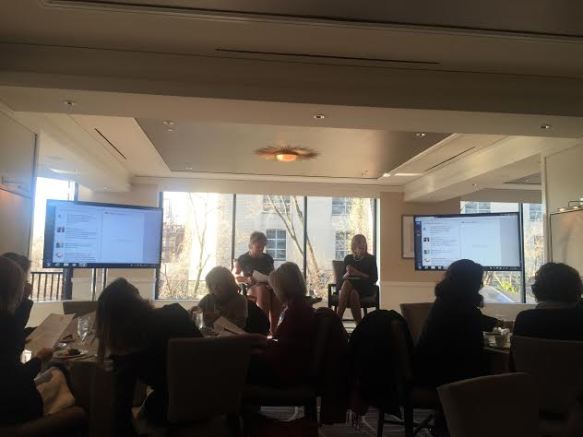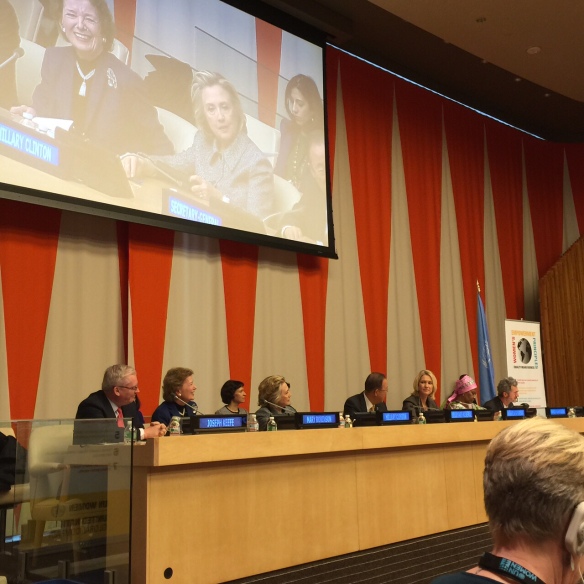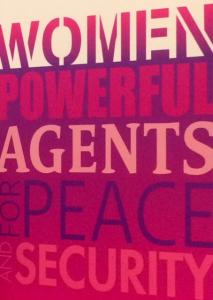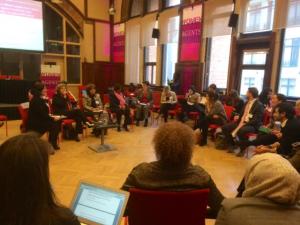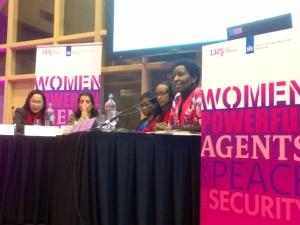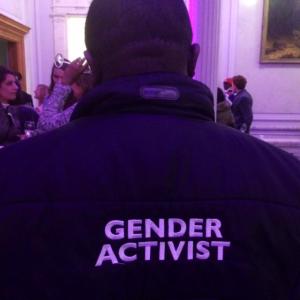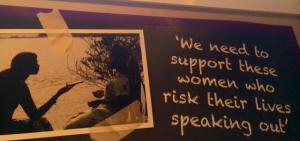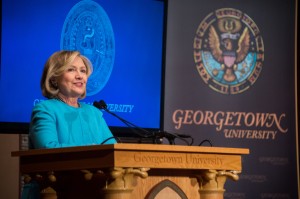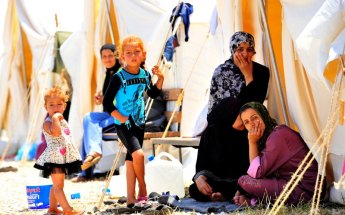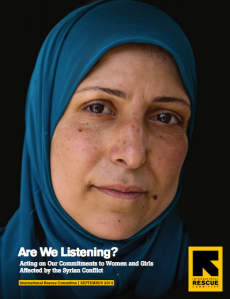By Ashley Binetti
Baroness Mary Goudie is a senior member of the House of Lords who firmly believes that “women [must] have a voice at the peace table and at every table where decisions are made.” She frequently writes about issues facing women and children, with an emphasis on gender equity, in her blog, which has garnered international attention. This Tuesday, March 31, Baroness Goudie hosted her 5th Annual Blog Breakfast. More than 50 women leaders who work on the advancement of women and girls gathered to discuss the theme “Global Uncertainty: Women are Key to Change.”
2015 is a big year of anniversaries in the women, peace and security field; it is the 20th anniversary of UN Fourth World Conference on Women in Beijing, and the 15th anniversary of the adoption of UN Security Council Resolution (UNSCR) 1325. Baroness Goudie reflected, “Beijing set the agenda…but hasn’t gone far enough. We need to lobby our governments, the OECD, and the G8 to work on the unfinished business of Beijing.” The Baroness noted how far we have come—particularly in terms of health and education—and yet how far the world has to go before achieving gender equality. Baroness Goudie reminded the room that economic and political participation remain the biggest gaps for women and girls around the world: “Out of 500 Fortune companies, only 23 of the CEOs are women” and “women occupy only 23 percent of parliamentary seats worldwide.”
In light of the conflict the world has seen in the past year, event moderator Stefenie Foster asked the Baroness to describe the role that women can play in peacebuilding. The Baroness recalled the triumph in passing UNSCR 1325, but urged that all actors should take concrete steps to ensure this document is not ignored as “just a piece of paper.” She continued, “There must be a woman at every [peace] table, and local women have to be there.” To achieve this goal, the Baroness stated that the international community must monitor peace processes, asking, “Why aren’t local women here? And if anyone tells you there are no qualified women, that is simply untrue.”
Rend Al-Rahim, President of Iraq Foundation, agreed that the international community must hold governments accountable. She noted the “naming and shaming” technique that Transparency International uses to shed light on corruption, and wondered if it would be worthwhile to create a similar barometer to track how governments are performing on engaging women in decision-making and reconciliation processes.
Al-Rahim also identified the importance of highlighting models where women have played a significant role in peace processes to demonstrate that inclusion works. Baroness Goudie shared that there are several such models—including Northern Ireland, South Africa and Liberia, among others. These models teach us that, beyond international pressure, “local women have to say they want to be at the table, and then show up and not leave until they are invited in.” Foster added that we have witnessed women’s meaningful engagement in the Philippines, and also in Colombia—their inclusion in negotiations is essential to engendering sustainable peace.
Alyse Nelson of Vital Voices raised another key issue facing the advancement of women: “There is incredible rhetoric on women’s equality, but political will and resources haven’t matched up. How do we get governments to put more money into this?” Baroness Goudie believes the answer lies in a combination of peer pressure and transparency. Donor governments must be encouraged to contribute additional support for these initiatives, and receiving governments must be transparent about how funds are used. The Baroness cited a paper recently published by the Gates Foundation, which describes how money is funneled into developing countries that often lack a functioning civil government or strong banking infrastructure. She emphasized that we must ensure strong governments are in place and that governance training is provided, but cautioned, “We have to be careful how we do it; we don’t want to cause ripples. We must work through NGOs [and with] governments.”
Baroness Goudie also spoke to concerns about partisan politics. She noted, “The issues we work on are thought to be soft issues, but they are powerful issues…they are good for people around the world.” The Baroness stressed that Women, Peace and Security is an area where we have been able to work across political lines; “It’s about being persistent, and saying we are not going away. These are common issues of humanity.”
Foster concluded the breakfast with one final question: How do we engage young people on these issues? The Baroness did not hesitate in saying, “We need a greater push…we need education!” Baroness Mary Goudie reminded the room throughout the morning that “If we don’t all come together, we are not going to get any change.” This means including everyone—women, men, young people, NGOs, governments and corporations—in this important work to advance gender equality and attain peace.
Ashley Binetti is the 2014-2015 Hillary Rodham Clinton Law Fellow at the Georgetown Institute for Women, Peace and Security. She received her J.D. from Georgetown University Law Center in 2014, specializing in human rights and transnational law.

